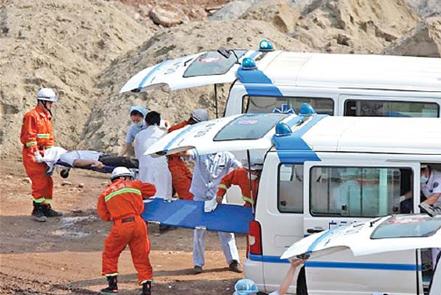Information vital for quake response
Not enough money
Since he was appointed to his position in 2001, Zhang had dreamed of building an emergency command center. There was never enough money.
 |
|
Firefighters and medical staff from Guangyuan, Sichuan province, run through emergency procedures in this 2010 photo. |
His office of 10 employees had a budget of 50,000 yuan (US$7,700) a year covering the expenses of everyday work, including phone bills, business travel, water and electricity. The central government would send money to the local government to subsidize quake-affected people's spending on food, clothing and housing, but only if a natural disaster occurred. Guangyuan received 15 million yuan a year at most.
The Sichuan government had a budget of 3 million to 4 million yuan for disaster relief and Guangyuan had 1 million to 3 million yuan, but that was far from enough to build an emergency command system or set up storage for relief supplies, Zhang said.
His dream has since been realized, at the cost of the devastating earthquake.
Computer connections
After the quake, the city bought 15 satellite phones to make sure communication among its major departments can be maintained during a severe natural disaster. County governments made purchases according to their budgets and needs. In Qingchuan, one of the 10 worst-hit counties, each town now has a satellite phone.
Major government officials from the township to city level are equipped with mobile emergency phones. Supported by telecom base stations that are built to withstand major earthquakes, the phones can work when power and phone services are down.
The construction of the emergency command center was completed in December. The center, costing more than 4 million yuan, includes offices and a computerized command system.
All counties and districts of Guangyuan can log on to the system to report and update emergency information to higher-level governments. They can even upload photos and videos taken at stricken areas so the governor will have a clear picture of the situation without being at the site.
The system also has an electronic map that indicates every village in the province. When a disaster hits, Zhang can pull up the map on a big screen and tell his colleagues how many counties are affected, which are worst-hit and which are less seriously damaged.
Three years ago, they had only a paper map. After the earthquake, the city officials moved outside the government building into a courtyard. Zhang took the map from a wall in his office and hung it from branches of a big tree, and the top leaders gathered around to make decisions and give orders.
Now the center is completed, providing decades' worth of improvements. "If we kept moving forward at the same speed as before, it would take us at least 20 more years to build a place like this," Zhang said.
 0
0 






